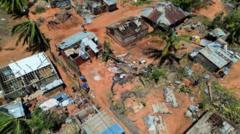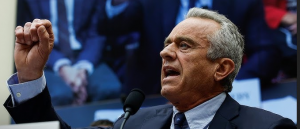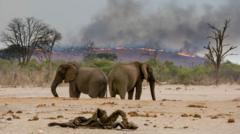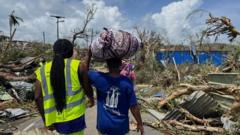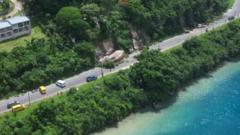The International Court of Justice (ICJ) in The Hague has commenced hearings on an impactful case meant to clarify governmental legal responsibilities related to climate change. Nearly 100 countries are presenting testimonies, with Vanuatu, a Pacific island nation with firsthand experience of climate impacts, as a key proponent for this legal inquiry. The hearings are aimed at determining both the responsibilities nations have in combating climate change and the reparations needed for damages tied to temperature rises. While the court’s final ruling, anticipated by 2025, may lack legal enforcement, its implications could bolster climate-related lawsuits worldwide.
"International Court of Justice Tackles Climate Change Responsibilities"
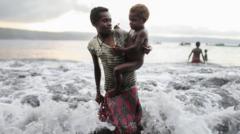
"International Court of Justice Tackles Climate Change Responsibilities"
The ICJ's hearings may redefine global legal expectations for climate action and consequences for countries causing environmental harm.
This initiative, proposed five years ago by law students in Fiji, was championed by Vanuatu after the nation faced devastating cyclones last year impacting about 80% of its population, leading to a prolonged state of emergency. The UN General Assembly, responding to concerns by Vanuatu and other nations, referred two critical legal questions to the ICJ regarding international obligations to mitigate climate change and the repercussions for countries that harm the climate through greenhouse gas emissions.
Ralph Regenvanu, Vanuatu’s special envoy, emphasized the urgency of the situation, stating, "We are on the frontline of climate change impact." He noted that obtaining an advisory opinion from the ICJ is vital in clarifying international legal obligations for climate action. Although the court cannot enforce its decisions, the opinions could serve as crucial legal support for small island states seeking compensation from developed countries for historical emissions that contribute to their ongoing challenges.
As the ICJ proceeds with the hearings, which will continue until December 13, it will also consider testimonies from other nations including the United States and China, as well as representatives from OPEC. This follows the recent COP29 climate summit in Azerbaijan, where promises from wealthier nations to provide $300 billion in climate finance by 2035 were criticized as inadequate by developing countries.
Ralph Regenvanu, Vanuatu’s special envoy, emphasized the urgency of the situation, stating, "We are on the frontline of climate change impact." He noted that obtaining an advisory opinion from the ICJ is vital in clarifying international legal obligations for climate action. Although the court cannot enforce its decisions, the opinions could serve as crucial legal support for small island states seeking compensation from developed countries for historical emissions that contribute to their ongoing challenges.
As the ICJ proceeds with the hearings, which will continue until December 13, it will also consider testimonies from other nations including the United States and China, as well as representatives from OPEC. This follows the recent COP29 climate summit in Azerbaijan, where promises from wealthier nations to provide $300 billion in climate finance by 2035 were criticized as inadequate by developing countries.

